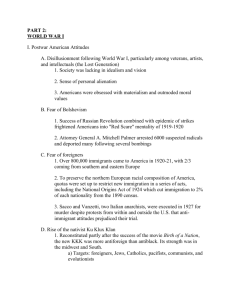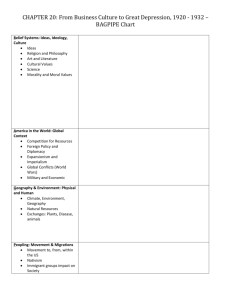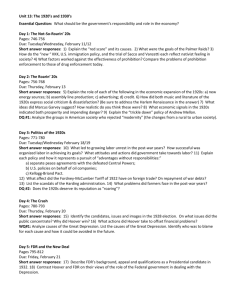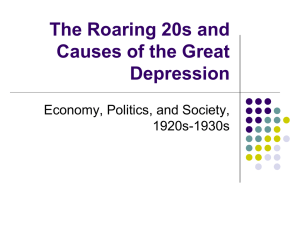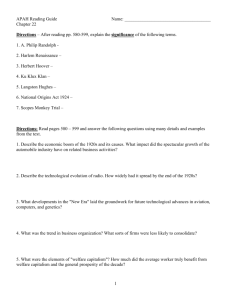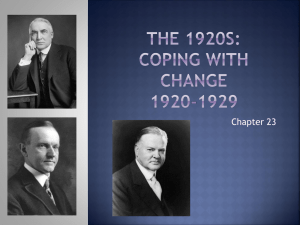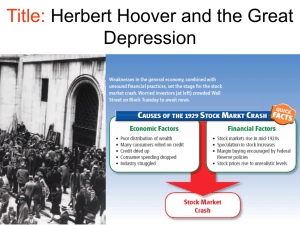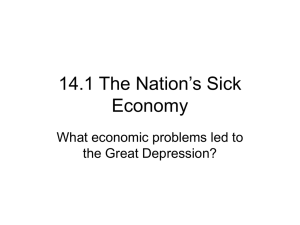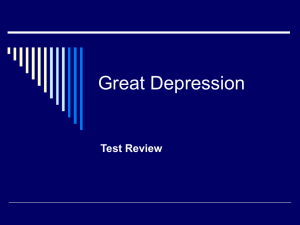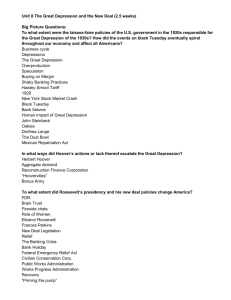CHAPTER 12 * The Second War for Independence and the Upsurge
advertisement
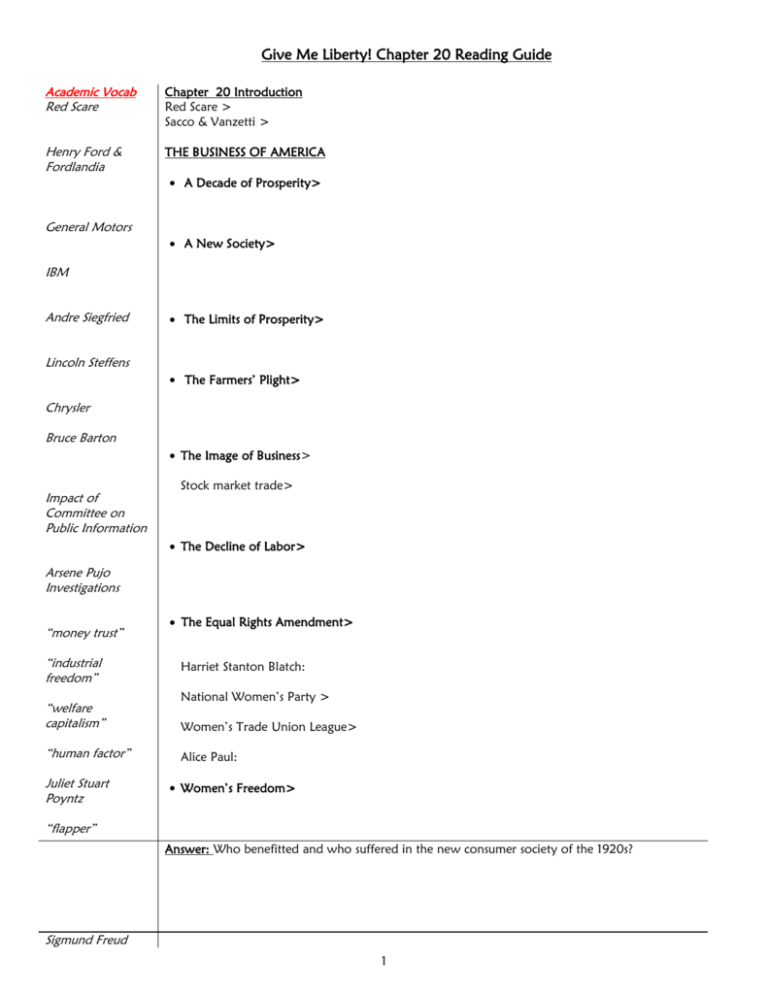
Give Me Liberty! Chapter 20 Reading Guide Academic Vocab Red Scare Chapter 20 Introduction Red Scare > Sacco & Vanzetti > Henry Ford & Fordlandia THE BUSINESS OF AMERICA A Decade of Prosperity> General Motors A New Society> IBM Andre Siegfried The Limits of Prosperity> Lincoln Steffens The Farmers’ Plight> Chrysler Bruce Barton The Image of Business> Impact of Committee on Public Information Stock market trade> The Decline of Labor> Arsene Pujo Investigations “money trust” “industrial freedom” “welfare capitalism” “human factor” Juliet Stuart Poyntz The Equal Rights Amendment> Harriet Stanton Blatch: National Women’s Party > Women’s Trade Union League> Alice Paul: Women’s Freedom> “flapper” Answer: Who benefitted and who suffered in the new consumer society of the 1920s? Sigmund Freud 1 Walter Lippmann BUSINESS AND GOVERNMENT The Retreat from Progressivism> Robert & Helen Lynd The Republican Era> George W. Norris Federal Reserve Board: William H Taft “normalcy” Herbert Hoover & Charles Evans Hughes Teapot Dome McNary-Haugen Bill Federal Trade Commission: Corruption in Government> Warren G. Harding> Albert. B Fall > The Election of 1924> Calvin Coolidge: Economic Diplomacy> “Isolationism” Answer: In what ways did the government promote business interests in the 1920s? “the degradation of American Freedoms” “banned in Boston” Hays Code THE BIRTH OF CIVIL LIBERTIES “the death of Progressivism’s Faith: The “Free Mob” The Lost Generation: A “Clear and Present Danger” D.H. Lawrence Schenck v. United States Civil Liberties Bureau/American Civil Liberties Union: The Court and Civil Liberties John Haynes Holmes Benjamin Gitlow: Chief Justice Oliver Wendell Holmes Free speech: 2 Jacob Abrams Louis Brandeis: “Proletarian dictatorship” “criminal anarchy” Answer: Why did the protection of civil liberties gain importance in the 1920s? Modernists v. fundamentalists THE CULTURE WARS (836-847) The Fundamentalist Revolt> Billy Sunday Charles Darwin theory of evolution The Scopes Trial (Scopes Monkey Trial)> ACLU: “moral liberty v. freedom of thought”: John Scopes Clarence Darrow Wm. Jennings Bryan Quota Border Patrol The Second Klan> Leo Frank: Closing the Golden Door “Quotas” > Cable Act of 1922: Immigration Act 1921: W,E,B.Du Bois National Origins Act Ethnic enclaves Immigration Act 1924: Race and the Law > “race Policy” Pluralism and Liberty > Cultural pluralism: “American Principles” Promoting Tolerance > Meyer v. Nebraska The Emergence of Harlem > 3 “slumming” Great Migration Countee Cullen, Langston Hughes, Claude McKay “The capital of black America” The Harlem Renaissance > “New Negro”: Ossian Sweet: Answer: What were the major flash points between fundamentalism and pluralism in the 1920s? John Maynard Keynes Golden Anniversary of the Festival of Light Black Tuesday THE GREAT DEPRESSION The Election of 1928> Herbert Hoover: American Individualism: Alfred E. Smith The Coming of the Depression> Causes of the Great Depression: Falling stock prices Why did it affect the USA so dramatically? Hoovervilles “The American Way of Life” Richard Whitney Americans and the Depression> Effects on population and migration: American Banking: “belt-tightening” Resignation and Protest> “Volunteerism” Hoover’s Response> Hawley-Smoot Tariff “associational action” The Worsening Economic Outlook> Reconstruction Finance Corporation: 4 John Dewey Charles Beard Federal Home Loan Bank System: Freedom in the Modern World> Answer: What were the causes of the Great Depression, and how effective were the government’s Responses by 1932? Chapter Review Questions How did consumerism affect the meaning of American freedom in the 1920s? Which groups did not share in the prosperity of the 1920s and WHY? How did observers explain the decrease in democracy and popular participation in government during the decade? How did government actions reflect conservative business interests in this period? Explain the justifications for immigration restriction laws as well as the reasons for specific exemptions to these laws. Did U.S. society in the 1920s reflect the concept of cultural pluralism as explained by Horace Kallen? Why/Why not? Identify the causes of the Great Depression. What principles guided President Hoover’s response(s) to the Great Depression, and how did this restrict his ability to help the American people? To what degree was race a global issue in the 1920s? 5 Key Terms and People the “New Negro” bonus marchers Claude McKay Reconstruction Finance Corporation slumming American Civil Liberties Union Oliver Wendell Holmes Warren Harding “the American way of life” The Man Nobody Knows Bruce Barton Henry Ford Robert and Helen Lynd Alice Paul Hays Code rise of the stock market “welfare capitalism” Fordlandia Scopes trial Ku Klux Klan Sacco-Vanzetti case Equal Rights Amendment the “flapper” Teapot Dome scandal McNary-Haugen farm bill Sacco-Vanzetti John Scopes James McReynolds Alfred E. Smith Leo Frank New Negro Bonus March National Origins Act Scopes Trial “100 percent Americanism” “illegal alien” Punjo investigations Border Patrol Hays code American Civil Liberties Union “clear and present danger” 6
